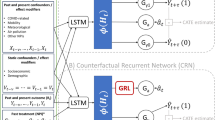Abstract
In this paper, we describe the deep learning-based COVID-19 cases predictor and the Pareto-optimal Non-Pharmaceutical Intervention (NPI) prescriptor developed by the winning team of the 500k XPRIZE Pandemic Response Challenge, a four-month global competition organized by the XPRIZE Foundation. The competition aimed at developing data-driven AI models to predict COVID-19 infection rates and to prescribe NPI Plans that governments, business leaders and organizations could implement to minimize harm when reopening their economies. In addition to the validation performed by XPRIZE with real data, the winning models were validated in a real-world scenario thanks to an ongoing collaboration with the Valencian Government in Spain. We believe that this experience contributes to the necessary transition to more evidence-driven policy-making, particularly during a pandemic.
Access this chapter
Tax calculation will be finalised at checkout
Purchases are for personal use only
Similar content being viewed by others
Notes
- 1.
- 2.
- 3.
Tonga, Malta, Turkmenistan and Virgin Islands- were not considered due to lack of reliable data.
- 4.
- 5.
- 6.
We selected amongst the most affected countries and regions across the globe.
- 7.
- 8.
- 9.
References
500k XPRIZE Pandemic Response Challenge, sponsored by Cognizant. https://www.xprize.org/challenge/pandemicresponse
Allen, L.: Some discrete-time SI, SIR, and SIS epidemic models. Math. Biosci. 124(1), 83–105 (1994)
Arora, P., Kumar, H., Panigrahi, B.K.: Prediction and analysis of COVID-19 positive cases using deep learning models: a descriptive case study of India. Chaos Solit. Fractals 139, 110017 (2020)
Ayyoubzadeh, S., Ayyoubzadeh, S., Zahedi, H., Ahmadi, M., Kalhori, S.: Predicting COVID-19 incidence through analysis of Google trends data in Iran: data mining and deep learning pilot study. JMIR Public Health Surveill. 6(2), e18828 (2020)
Belakaria, S., Deshwal, A., Doppa, J.: Max-value entropy search for multi-objective bayesian optimization. In: Wallach, H., Larochelle, H., Beygelzimer, A., d’Alché-Buc, F., Fox, E., Garnett, R. (eds.) NeurIPS, vol. 32 (2019)
Brauner, J.M., et al.: Inferring the effectiveness of government interventions against COVID-19. Science 371(6531) (2021)
Chatterjee, A., Gerdes, M., Martinez, S.: Statistical explorations and univariate timeseries analysis on COVID-19 datasets to understand the trend of disease spreading and death. Sensors 20(11), 3089 (2020)
Chimmula, V.K.R., Zhang, L.: Time series forecasting of COVID-19 transmission in Canada using LSTM networks. Chaos Solit. Fractals 135, 109864 (2020)
Ferguson, N., et al.: Strategies for containing an emerging influenza pandemic in Southeast Asia. Nature 437(7056), 209–214 (2005)
Flaxman, S., et al.: Estimating the effects of non-pharmaceutical interventions on COVID-19 in Europe. Nature 584, 257–261 (2020)
Hale, T., et al.: A global panel database of pandemic policies (Oxford COVID-19 Government Response Tracker). Nat. Hum. Behav. 1–10 (2021)
Hethcote, H.: The mathematics of infectious diseases. SIAM Rev. 42(4), 599–653 (2000)
Hochreiter, S., Schmidhuber, J.: Long short-term memory. Neural Comput. 9(8), 1735–1780 (1997)
Khan, M., Hossain, A.: Machine learning approaches reveal that the number of tests do not matter to the prediction of global confirmed COVID-19 cases. Front. Artif. Intell. Appl. 3, 90 (2020)
Lauer, S., Grantz, K., Bi, Q., Jones, F., et al.: The incubation period of coronavirus disease 2019 (COVID-19) from publicly reported confirmed cases: estimation and application. Ann. Intern. Med. 172(9), 577–582 (2020)
Lu, Z., et al.: NSGA-Net: neural architecture search using multi-objective genetic algorithm (extended abstract). In: Bessiere, C. (ed.) Proceedings of the 29th International Joint Conference on Artificial Intelligence (AI), IJCAI-20, pp. 4750–4754 (2020)
Miikkulainen, R., et al.: From prediction to prescription: evolutionary optimization of nonpharmaceutical interventions in the COVID-19 pandemic. IEEE Trans. Evol. Comput. 25(2), 386–401 (2021)
Pastor-Satorras, R., Castellano, C., Van Mieghem, P., Vespignani, A.: Epidemic processes in complex networks. Rev. Mod. Phys. 87, 925–979 (2015)
Pereira, I., et al.: Forecasting COVID-19 dynamics in Brazil: a data driven approach. Int. J. Environ. Res. Public Health 17(14), 5115 (2020)
Rahman, M., et al.: Data-driven dynamic clustering framework for mitigating the adverse economic impact of COVID-19 lockdown practices. Sustain. Cities Soc. 62, 102372 (2020)
Riccardi, A., Gemignani, J., Fernández-Navarro, F., Heffernan, A.: Optimisation of non-pharmaceutical measures in COVID-19 growth via neural networks. IEEE Trans. Emerg. Topics Comput. 5(1), 79–91 (2021)
Sameni, R.: Model-based prediction and optimal control of pandemics by nonpharmaceutical interventions. arXiv preprint arXiv:2102.06609 (2021)
Tayarani, N., Mohammad, H.: Applications of artificial intelligence in battling against COVID-19: a literature review. Chaos Solit. Fractals 110338 (2020)
Yousefpour, A., Jahanshahi, H., Bekiros, S.: Optimal policies for control of the novel coronavirus disease outbreak. Chaos Solit. Fractals 136, 1109883 (2020)
Zeroual, A., Harrou, F., Dairi, A., Sun, Y.: Deep learning methods for forecasting COVID-19 time-series data: a comparative study. Chaos Solit. Fractals 140, 110121 (2020)
Acknowledgements
The authors have been partially supported by grants FONDOS SUPERA COVID-19 Santander-CRUE (CD4COVID19 2020–2021), Fundación BBVA for SARS-CoV-2 research (IA4COVID19 2020-2022) and the Valencian Government. We thank the University of Alicante’s Institute for Computer Research for their support with computing resources, co-financed by the European Union and ERDF funds through IDIFEDER/2020/003. MAGM acknowledges funding from MEFP Beatriz Galindo program (BEAGAL18/00203).
Author information
Authors and Affiliations
Corresponding author
Editor information
Editors and Affiliations
Rights and permissions
Copyright information
© 2021 Springer Nature Switzerland AG
About this paper
Cite this paper
Lozano, M.A. et al. (2021). Open Data Science to Fight COVID-19: Winning the 500k XPRIZE Pandemic Response Challenge. In: Dong, Y., Kourtellis, N., Hammer, B., Lozano, J.A. (eds) Machine Learning and Knowledge Discovery in Databases. Applied Data Science Track. ECML PKDD 2021. Lecture Notes in Computer Science(), vol 12978. Springer, Cham. https://doi.org/10.1007/978-3-030-86514-6_24
Download citation
DOI: https://doi.org/10.1007/978-3-030-86514-6_24
Published:
Publisher Name: Springer, Cham
Print ISBN: 978-3-030-86513-9
Online ISBN: 978-3-030-86514-6
eBook Packages: Computer ScienceComputer Science (R0)





